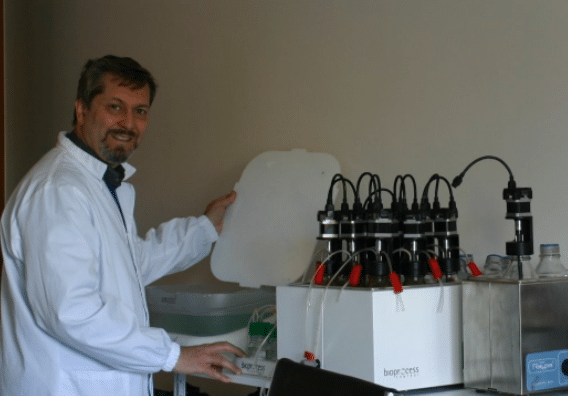Formación WBA: Enriquecimiento de Biogás Tecnología Y Oportunidades – En Español
LIMITED SPACE AVAILABLE
Miércoles, 24 de Agosto, 14:00 – 16:00 UK BST
En línea: Zoom
Cómo seleccionar la tecnología más adecuada para su proyecto de biometano
Orador: Docente Mario A. Rosato

A quién se dirige:
Inversores, ingenieros proyectistas, estudiantes de ingeniería, autoridades públicas, investigadores universitarios.
Objetivos:
Existen distintas técnicas de purificación del biogás y la información sobre las mismas que publican los fabricantes suele ser contradictoria o incompleta, por lo que es difícil comparar ofertas. El curso propone dos objetivos: proveer una visión panorámica general y neutral sobre las técnicas de purificación del biogás y proveer un método de cálculo simple (hoja Excel y algunas fórmulas) que facilita las comparaciones entre procesos que operan en condiciones muy distintas. El contenido teórico se limitará al mínimo de nociones, privilegiando los aspectos prácticos del proceso de selección.
Read blogs:
- Blog: Biogás e independencia del gas ruso: España le ganará de mano a Italia? Click here to read the full blog from Mario A. Rosato
- Blog: Biogas and independence from Russian gas: will Spain beat Italy on time? Click here to read the full blog from Mario A. Rosato
-
How Online Services are Helping the Biogas Industry. Click here to read the interview with Mario A. Rosato.
Programa del curso
- Diferencias entre limpieza y purificación del biogás.
- Panorámica de los distintos procesos de purificación: casos de estudio.
- Tecnologías de purificación a seco.
- Carbón Activado (PSA, pressure swing adsorption).
- Zeolitas sintéticas.
- Tecnologías de purificación a seco.
- Aminas inmobilizadas.
- Membranas selectivas.
- Tecnologías de purificación a húmedo.
- Lavado de gas con agua.
- Lavado con agua/PEG (proceso Selexol).
- Lavado con soluciones alcalinas (Proceso Benfield).
- Lavado con soluciones de aminas.
- Lavado con solventes (Proceso Rectisol).
- Tecnologías
- Purificación criogénica.
- Bioupgrading.
- Electrometanogénesis.
- Selección racional del proceso más adecuado a cada contexto.
- El límite termodinámico:la máquina ideal de Van t’Hof y la separación perfecta e imperfecta de mezclas de gases.
- Mínimo trabajo y mínimo calor de separación imperfecta.
- El trabajo ideal de compresión.
- El trabajo ideal de licuefacción.
Ticket prices:
WBA Member: £99
WBA Non-member: £149
National Association Members: £129
Contact us for group discounts

Mario is the author of Managing Biogas Plants, A Practical Guide. He’s also provided professional training to more than 200 biogas plant operators and engineers, mostly in Italy.
Read Bio
Mario A. Rosato is an electrical, electronic, and environmental engineer, as well as a scientific journalist. He built his first home-sized digester in Argentina when he was aged 16. The son of a university professor and researcher, he learnt to employ sophisticated instruments in his favorite playground: his father’s lab. At the age of 25 he obtained a scholarship to specialize in renewable energies in Italy. At 28 he chose to leave the academic research world and devoted himself to the development of industrial solutions. In 1990 he settled in Italy and in 2000 he moved to Spain. In 2004 he became partner and scientific director of Bioenergia Aragonesa SL. In 2006 he patented the AFADS system, a multitrophic bioreactor for wastewater treatment. In 2009 he founded Sustainable Technologies SL in Barcelona. From 2010 he expanded his company’s activity to Italy, where he became professor at several private professional institutes. Since then he has trained more than 100 biogas plant managers in Italy and Spain. He installed a laboratory for applied research and routine anaerobic digestion tests in the Technologic Park of Pordenone in 2011. The same year he won The Economist’s award for the best entrepreneurial idea to tackle global climate change, based on the production of biohydrogen and the cultivation of bamboo in a circular economy cycle. Some months later, he received the Green Vision Award from Modus Vivendi magazine in Rome. His industrial solutions, based on original applied research, place him 4th in the worldwide Top Solvers list on Innocentive.com. In 2012, during the research project H2Ocean, funded by the European Commission’s 7th Framework Program, he develops a novel type of digester for marine biomass, specially conceived for offshore operation. In 2013 he won two international awards for the conceptual design of a domestic garbage digester, meant for low-income Indian families. Since 2014 he has been in charge of the column on bioenergy for agronotizie.it, a specialized e-zine for agronomists and farming professionals. In 2015 he was a member of the technical commission in charge of redacting the Italian norm on the biochemical methane potential (BMP) test protocol, and his contribution focused on the error propagation analysis and improving both accuracy and precision.

